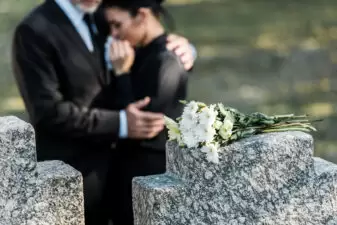
Funerals are a time for mourning, reflection, and honoring a loved one who has passed away. However, time has created many funeral etiquette rules that can sometimes add unnecessary stress and anxiety to an already difficult situation. Whether it’s because of cultural absorption or depictions in movies, many traditional funeral etiquette rules are often misleading or outdated. Here are 14 common misconceptions about how you should behave and what you should do at a funeral.
1. You Must Wear Black

The rule that attendees must wear black is one of the most common funeral etiquette rules. While black is a traditional color of mourning in many cultures, it’s more important to dress respectfully and conservatively. Many families now request brighter colors or specific hues to celebrate the life of the deceased, rather than strictly mourning their death. They may also create custom t-shirts for everyone to wear.
2. Flowers Are Always Appropriate

Flowers are a common condolence gift, but some families may request donations to a charity instead. Always check the obituary or with close family members for any specific preferences regarding flowers. It may also be beneficial to bring food or coffee for the family. They’re likely in a daze going through the day, so any little thing you can do to make it easier would be helpful.
3. Children Should Not Attend Funerals

Some parents are comfortable with bringing their children to funerals. This is beneficial since involving children in the funeral can help them understand and cope with the concept of death. It’s important to prepare your children for what to expect. You should also prep them on common funeral etiquette rules to follow like keeping their voices low and respectfully listening when someone is speaking.
4. You Must Send a Condolence Card

While sending a condolence card is a thoughtful gesture, it is not mandatory. Expressing sympathy can also be done personally at the service. You can also call the bereaved or send a meal to their home. The key is sincerity in your condolences, whether it’s through a call or through some other means.
5. Immediate Family Must Not Laugh or Smile

Expecting the immediate family to remain solemn throughout the proceedings disregards the complex emotions involved in mourning. Sharing happy memories or moments of laughter can be therapeutic and help celebrate the life of the deceased. Laughter is said to reduce tension and lower stress. Both of which can be beneficial to mourners who are going through a difficult time.
6. You Shouldn’t Talk About the Deceased

Funerals and memorial services can be solemn affairs, but some see them as celebrations of life. As such, avoiding mention of the deceased to prevent further sadness may not be the right choice. Speaking fondly and openly about the deceased can provide comfort and healing to the grieving family. By starting a dialogue, you’re acknowledging the importance of their loved one’s life and legacy.
7. All Mourners Must View the Body

The choice to view the body should be left up to each mourner. For some, this is an important part of the grieving process as it offers closure. For others, it can be distressing to see the body. Respecting each person’s comfort level is more important than adhering to this traditional expectation.
8. You Must Follow a Formal Mourning Period

Everybody handles grief differently. As such, some people take more time to start feeling like themselves than others. Fixed mourning periods do not reflect the personal nature of grief, which varies widely among individuals. It’s unrealistic and unhelpful to expect someone’s grieving process to conform to a set timeline.
9. Guests Must Bring a Gift or Offering

Bringing a gift to a funeral is not necessary. Your presence and support are what truly matter. If you feel compelled to give something, consider a donation to a designated charity or a thoughtful gesture like a meal for the family. Being there for the bereaved in any way you can is more important than anything.
10. Social Media Posts About the Funeral Are Appropriate

Social media has changed the way society communicates with one another including the way we handle funerals. However, posting about a funeral on social media can be seen as inconsiderate or intrusive. Keep in mind that some family members or friends may not be aware of the death quite yet. Always respect the family’s privacy and preferences regarding social media.
11. You Should Stay Away If You Were Not Close to the Deceased

Even if you didn’t have a close relationship with the deceased, your presence can still provide comfort to those who were. Attending a funeral shows respect and support for the community of people affected by the loss. Make the effort to attend the funeral if you can attend. Your support will be appreciated by anyone grieving, even if they don’t know you personally.
12. The Funeral Is Only for Mourning

Funerals are inherently sad, but you don’t have to spend the entire time mourning. There may be opportunities to celebrate the life of the deceased. Sharing positive memories and stories can be a powerful way to honor their impact. The funeral will likely be a mix of happiness and sadness, and that’s completely normal.
13. You Must Always Use Formal Language

Depending on the situation, using overly formal language can sometimes create a barrier. It’s more important to speak from the heart, whether you’re sharing a memory or offering your condolences to the bereaved. Be personable and approach the family in mourning in a way that’s respectful and genuine. It will mean more than being overly formal.
14. Avoiding the Family If You Don’t Know What to Say

It can be hard to know the right thing to say at a funeral. However, that shouldn’t prevent you from offering your condolences. Sometimes, a simple “I’m sorry for your loss” or “I’m here for you” is enough to show that you care. Avoiding the family can come across as rude or insincere.
Break the Rules

Funeral etiquette rules may be overly rigid and formal. Sometimes following the rule book makes you seem insincere, overly formal, and unapproachable. Show your support, respect, and comfort in ways that are meaningful and appropriate to the bereaved family. The key is to act with empathy and consideration.
Read More:
How to Afford an Unexpected Funeral
How to Plan a Beautiful Funeral without Overspending

Alyssa Serio has been a writer and editor since graduating from Aurora University in 2014. In her free time, she loves reading, playing volleyball, and watching any horror movie (even the bad ones) with her husband.

